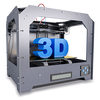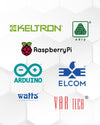
How The DIY Electronics Trend Is Empowering People, Communities, Businesses
In the maker community, there is a mantra: If you can't open it you don't own it. It is part of the Maker's Bill of Rights that lists exactly what should happen to make hardware accessible, extensive, and repairable. For gadget tinkerers, the manifesto is not a quaint or cute concept but something to live by.
And why not? When it comes to our electronic devices, why would we not demand easy-to-open cases, replaceable batteries, and components, screws instead of glues, easily accessible documents and drivers, and so on? Without these things, ownership of a device you've bought and paid for is actually still quite questionable. If you can't -- no, if you are actively discouraged -- to open up and tinker with devices then you don't own it, you're just renting.
In a culture that adores ownership, why do so few people care about truly taking ownership of items?
While manufacturers may claim in not so many words that they're saving you from yourself -- after all, dropping a ton of money on a gadget that you open up to try and fix or upgrade yourself, only to break it worse is disappointing, to say the least. But if companies made it easy to do just that, how might our world be made better by such access and encouragement?
Many DIYers are breaking through those "warranty voided" stickers, digging through boxes of components, coming up with plans and prototypes for imaginative ideas for solving problems, and we're seeing amazing results in empowering individuals, communities and businesses to pursue their concepts.
Making, Modifying, Hacking and Taking Ownership
For individuals, taking ownership of their electronics is about cracking open their devices and digging in to customize, hack, modify, repair, and change it in any other way they want. It's the ability to take what devices you have and make them function as you picture in your imagination, whether that be changing what already exists in your hands or building something from spare parts.
This kind of creativity, exploration, and innovation with electronics is what sparks solutions and new functions for devices, empowering the individual to make electronics work for them rather than them making do only with what the manufacturers decided a device should do.
An example of empowerment includes the Tweet-A-Watt, a hacked version of the Kill-A-Watt that tweets the energy consumption you're measuring. Essentially, the makers used a Standard Kill a Watt and hacked it to be able to recharge itself and turn on an Xbee wireless module which connects it to the internet and allows it to tweet the power usage recorded for the day. The hope was that a public tweet about power consumption would encourage the user to minimize power use as well as allow friends to compete to get the lowest numbers for the day. The effect could be habit-changing in a good way. The project eventually won an award at Greener Gadgets and kits became available to others wanting to build their own Tweet-A-Watts.
Not only are individuals encouraged to turn a product into something else, but they're also encouraged to do something with the information gleaned from the product. It's a product made better -- or at least specialized -- thanks to DIY ingenuity.
As you take on the Maker Manifesto's mantra and pop open those electronics to customize or create something new, you see more value in not only what you can do with it, but in what you're doing -- you see more value in YOU.
Creating Communities with DIY Projects
As much as the Tweet-A-Watt example applies to the Individual, it also expands into the kind of empowerment a community gains through DIY collaboration and innovation. Communities pop up around projects or trends in hacking or modifying new devices, the Kinect from Microsoft being a great example as well as the gun-ho makers building Arduino-based projects or gadgets that will fit inside Altoids tins. The common interests both create and strengthen communities around what might otherwise be individual pursuits.
Makerspaces offer an opportunity for DIYers to meet up and share ideas and inspiration around similar interests such as robotics or hacking, or even much-needed DIY-girls-only spaces. Instructable is another example of a thriving community of DIYers, which wouldn't exist but for the maker mentality and of course technology. Both the platform for sharing projects and the projects shared are DIY-centric. Makers write up the instructions for their own projects and share it on the Instructables platform, where other users can try the project out for themselves, ask questions, or even add to the tweaking and perfecting of the project by adding their comments and insights. Through Instructables, DIYers can see what everyone else is up to and share their own projects proudly. There is a constant inflow of unique ideas that use technology in unexpected and clever ways.
This DIY community support is the driver behind the next generation of DIYers, those who are growing up familiar with gadgets and their possibilities, the tinkerers who can do as much with gadgets today as our predecessors a few generations back could do with household tasks from carpentry to blacksmithing to dress-making.
Bringing the DIY Ethic Into Businesses
Finally, the DIY trend in electronics has untold possibilities for businesses. Really, it always has. After all, Apple and Dell are companies started by DIYers in garages. But there are businesses not only starting off thanks to DIYers but that actively encourage the DIY community to engage with their gadgets even more.
B-Squares, for example, is dependent on the notion that people will start shifting toward wanting to customize devices or build their own. The concept behind B-Squares is fairly straight-forward -- each square performs a specific function; one is a solar charger, one a battery, one an LED light, one a microcontroller, and so on. They connect magnetically and a user can literally just place various B-Squares next to each other to get them to perform a function from being a solar-powered flashlight to announcing when a bird has arrived back at the birdhouse! The functions the squares perform are slowly expanding, and with that expansion comes the diversity of ways they can be used together as a system to accomplish something, and users are encouraged to submit "recipes" for how they've used various squares in a set-up to accomplish a task such as sending a text when the washing machine is done with a load of laundry. The squares will be limited only by the imagination and DIY capabilities of the users -- in other words, an electronics company that places its future in the capable hands of makers, and in such a way that eventually it could alter the way more traditional electronics manufacturers respond to consumer needs. Who knows... it could be revolutionary!
Another rising company that supports the participation of DIYers in electronics is iFixit, the gadget repair website that continually rolls out high-quality instructions, tutorials, and tear-downs of popular devices. Eventually, they want to have a free repair manual for every electronic device out there, all of which can be edited and updated by the users doing the repairs on their own devices. The company's goal is not only to make repairing electronics easy and fun for users but also to make repairable gadgets a requirement for manufacturers. Again, if you can't open it, you don't own it. iFixit encourages taking full ownership of one's devices.
The Growing DIY Trend and Empowerment
The DIY trend in electronics is growing and with it is the idea that anyone can, and should be able to, pop open a device and fudge with it. But where is the trend coming from? Johnny Chung Lee has an interesting theory:
In the 90's and early 2000's, Moore's law was absolute king. The primary deciding factor in purchasing an electronic product was simply how fast it was. This meant an intense focus on tighter and tighter integration of components and all the functionality was disappearing into tiny little black chips that could not be accessed nor modified by mere mortals. But now, people barely talk about raw "megahertz" or "megabytes" anymore. General purpose computers have gotten "fast enough"...
A byproduct of having such an immense surplus in computing, is that the tools you can buy within a hobbyist budget have also gotten exponentially better in just the past 3-4 years, while the improvement in professional tools have been more modest. The difference in capability between the electronics workbench of a professional engineer and a hobby engineer is getting really really small...
As a result, hobbyists are out pacing many professionals in the same domain simply due to sheer parallelism. Perhaps not as dramatically, but this is happening with nearly all genres of electronic and scientific equipment. One day, maybe we'll see backyard DIY electron beam drilling for nano-machining.
If a DIYer has the tools, the information, the ability, and the encouragement to keep up a hands-on approach to their gadgets then the upcoming years could show us an incredible advancement of ideas that can be applied to all sorts of subjects, from monitoring environmental concerns or species to actively participating in data collection and more. Not even the sky is the limit anymore.



